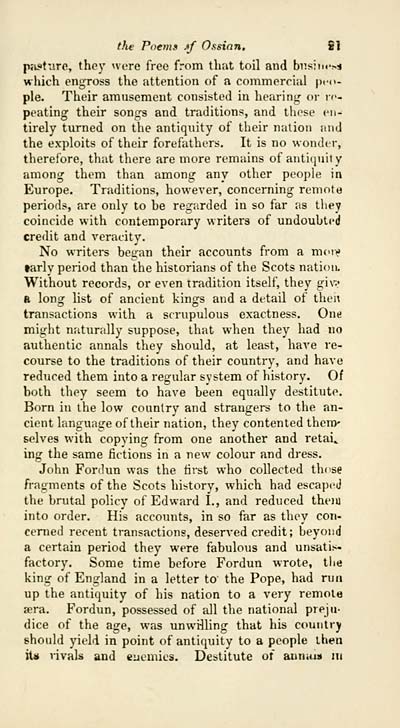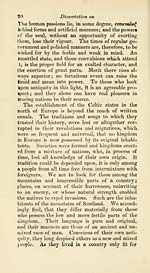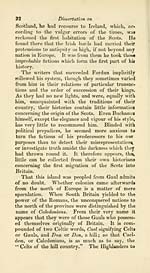Ossian Collection > Poems of Ossian
(35)
Download files
Complete book:
Individual page:
Thumbnail gallery: Grid view | List view

the Poems j>f Ossion, SI
p;i«t'.!rc, they were free from that toil and bv.sitif>s
which engross the attention of a commercial pt<<-
ple. Their amusement consisted in hearing- or ic-
peating their songs and traditions, and these en-
tirely turned on the antiquity of their nation and
the exploits of their forefathers. It is no wonder,
therefore, that there are more remains of antiquity
among them than among any other people in
Europe. Traditions, however, concerning remote
periods, are only to be regarded in so far as they
coincide with contemporary writers of undoubted
credit and veracity.
No writers began their accounts from a mcie
tarly period than the historians of the Scots natioiu
Without records, or even tradition itself, they gi\?
a long list of ancient kings and a detail of thei\
transactions with a scrupulous exactness. One
might naturally suppose, that when they had no
authentic annals they should, at least, have re-
course to the traditions of their country, and have
reduced them into a regular system of history. Of
both they seem to have been equally destitute.
Born in the low country and strangers to the an-
cient language of their nation, they contented them-
selves with copying from one another and retail
ing the same fictions in a new colour and dress.
John Fordun was the first who collected those
fragments of the Scots history, which had escaped
the brutal policy of Edward I., and reduced them
into order. His accounts, in so far as they con-
cerned recent transactions, deserved credit; beyond
a certain period they were fabulous and unsatis-
factory. Some time before Fordun wrote, the
king of England in a letter to the Pope, had run
up the antiquity of his nation to a very remote
aera. Fordun, possessed of all the national preju-
dice of the age, was unwilling that his country
should yield in point of antiquity to a people then
jt« rivals and euomies. Destitute of annuw m
p;i«t'.!rc, they were free from that toil and bv.sitif>s
which engross the attention of a commercial pt<<-
ple. Their amusement consisted in hearing- or ic-
peating their songs and traditions, and these en-
tirely turned on the antiquity of their nation and
the exploits of their forefathers. It is no wonder,
therefore, that there are more remains of antiquity
among them than among any other people in
Europe. Traditions, however, concerning remote
periods, are only to be regarded in so far as they
coincide with contemporary writers of undoubted
credit and veracity.
No writers began their accounts from a mcie
tarly period than the historians of the Scots natioiu
Without records, or even tradition itself, they gi\?
a long list of ancient kings and a detail of thei\
transactions with a scrupulous exactness. One
might naturally suppose, that when they had no
authentic annals they should, at least, have re-
course to the traditions of their country, and have
reduced them into a regular system of history. Of
both they seem to have been equally destitute.
Born in the low country and strangers to the an-
cient language of their nation, they contented them-
selves with copying from one another and retail
ing the same fictions in a new colour and dress.
John Fordun was the first who collected those
fragments of the Scots history, which had escaped
the brutal policy of Edward I., and reduced them
into order. His accounts, in so far as they con-
cerned recent transactions, deserved credit; beyond
a certain period they were fabulous and unsatis-
factory. Some time before Fordun wrote, the
king of England in a letter to the Pope, had run
up the antiquity of his nation to a very remote
aera. Fordun, possessed of all the national preju-
dice of the age, was unwilling that his country
should yield in point of antiquity to a people then
jt« rivals and euomies. Destitute of annuw m
Set display mode to: Large image | Transcription
Images and transcriptions on this page, including medium image downloads, may be used under the Creative Commons Attribution 4.0 International Licence unless otherwise stated. ![]()
| Early Gaelic Book Collections > Ossian Collection > Poems of Ossian > (35) |
|---|
| Permanent URL | https://digital.nls.uk/77568340 |
|---|
| Description | Selected books from the Ossian Collection of 327 volumes, originally assembled by J. Norman Methven of Perth. Different editions and translations of James MacPherson's epic poem 'Ossian', some with a map of the 'Kingdom of Connor'. Also secondary material relating to Ossianic poetry and the Ossian controversy. |
|---|
| Description | Selected items from five 'Special and Named Printed Collections'. Includes books in Gaelic and other Celtic languages, works about the Gaels, their languages, literature, culture and history. |
|---|

